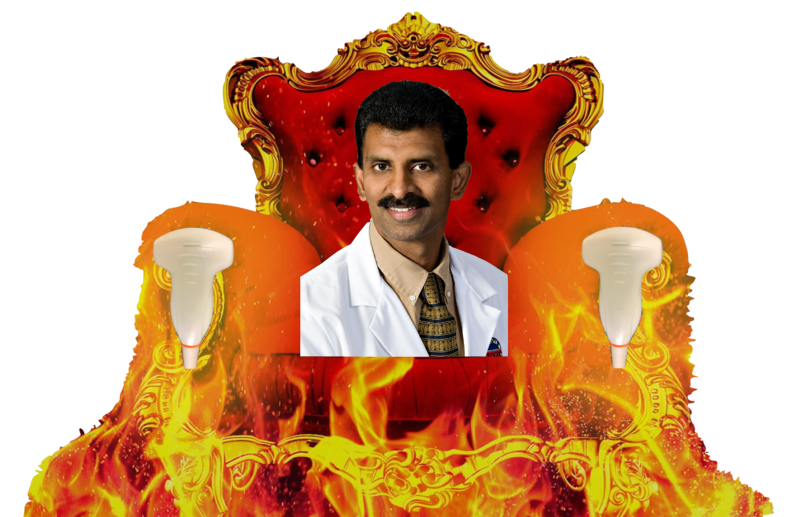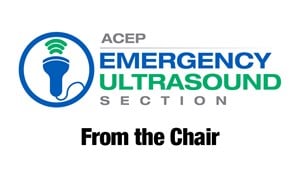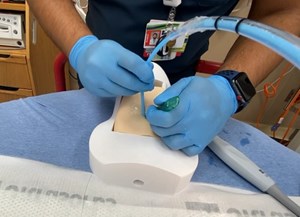
Sono Hot Seat with Srikar Adhikari: On POCUS Research
Srikar Adhikari, MD, FACEP
University of Arizona
@SonoStache
Questions posed by Stephen Alerhand, MD
Q: What experiences, encounters, and/or mindset led you towards a career in POCUS and more specifically, POCUS research?
My exposure to POCUS was minimal during my residency training in the early 2000s. At that time, it wasn’t required and opportunities to learn it were limited. Following my residency, while working in a non-academic community setting for four years, I saw firsthand how POCUS can significantly impact patient care. I felt handicapped not having those skills in daily clinical practice. Likewise, I realized that there was a need for POCUS leaders to establish and oversee POCUS programs in emergency departments. That’s when I decided to pursue fellowship training in POCUS. It was the best career decision I ever made, and it completely changed my academic trajectory. Since then, I have been fortunate to be surrounded by wonderful mentors, colleagues, and trainees who contributed to my accomplishments.
Out of all the various ways in which I am involved with POCUS (ie, teaching, clinical use, and research), research is the most challenging and gratifying. Research and dissemination of innovative knowledge is the most effective way to improve clinical practice and patient care. Fortunately, I truly love every aspect of the research endeavor: study design, implementation, data analysis, manuscript writing, etc. I even like grant writing. For these reasons, POCUS research has become a big part of my career. Finally, my fellowship director, Mike Blaivas, was a major influence on my decision to pursue POCUS research. He was a phenomenal mentor whose investigations resulted in the publication of hundreds of manuscripts.
Q: What pearls of wisdom, specific to POCUS research, would you provide to someone only starting their journey as a US fellow in 2023?
For a US fellow who is interested in POCUS research, I suggest the following:
1) Get structured training in clinical research, eg, ACEPs Emergency Medicine Basic Research Skills (EMBRS), SAEM’s Advanced Research Methodology Evaluation and Design in Medical Education (ARMED MedEd) course, etc. Such experience is immensely helpful in designing studies, addressing pitfalls, etc. 2) Find good mentors. The importance of this cannot be overstated. Mentors can be within or outside the local institution. I recommend choosing mentors with and without POCUS expertise. 3) After your fellowship, find an institution to work at that has a solid, sustainable research infrastructure. 4) Critically look at your CV every month to assess whether you have made progress on your research/scholarship. 5) Specific to manuscript writing, don’t procrastinate just because you want to write a perfect manuscript or do a perfect study. Find collaborators for every project, get started, and it will happen.
Q: To this day, what has been your favorite POCUS experience or memory? A specific case, conference, manuscript, experience?
Thus far, my favorite experience has been when a faculty member from an outside institution called me to inform me that one of our published articles on POCUS billing influenced her to change her POCUS reimbursement program for the better. She used our research and recommendations to convince her department leadership to obtain the necessary resources, build infrastructure, and develop a successful reimbursement program at her institution. It was very gratifying to see that our research made an impact on other programs.
Q: You spoke about up-and-coming POCUS applications in the ED on an US Gel podcast a few years ago (eg, 3D US for arthrocentesis). Today, what would you consider up-and-coming applications? What are the barriers for implementation (eg, industry, credentialing, safety)? For instance, why hasn't 3D US for arthrocentesis been taken up yet? How can a faculty member move toward implementing something like that?
Even though 3D ultrasound can enhance procedural efficacy, safety, and diagnostic accuracy, I believe it has not become a mainstream tool primarily because of cost and lack of research in POCUS settings. Vendors are unlikely to invest their resources to integrate this type of technology on POCUS devices unless they see returns from their investments. On the other hand, technology like auto speckle tracking echocardiography (STE) is available on some POCUS devices because of the interest and perceived demand among POCUS users. Likewise, physicians investing the time to use such technology and its widespread implementation, mainly depends on what kind of impact it has on patient care in a busy emergency department. Training (with auto tools) and credentialing are relatively easy to accomplish, but cost will be an important factor.
I do believe miniaturization of ultrasound devices and transducer technology will continue to evolve, which will increase the utilization of POCUS in emergency departments, especially in nonacademic community ED settings. I foresee handheld devices being used as standalone devices instead of cart-based systems in such settings. In certain pods in academic EDs (eg, trauma, resus, IV access, etc.), these devices will even replace cart-based ultrasound machines. In addition, artificial intelligence is rapidly making an impact on medical imaging. More specifically, multiple studies of deep learning applications in point-of-care ultrasound will soon be emerging and will be commercially available for use on ultrasound machines. This will very likely increase the use of POCUS by operators with minimal expertise. Overall, accuracy, ethics, cost, and reimbursement will determine the implementation of AI tools in clinical practice.
Q: Your US division regularly churns out POCUS and POCUS education research. What words of wisdom would you share with a US Division Director working to develop their own research team, with roles and responsibilities, towards maximum efficiency in research?
Most of us are required to publish for academic advancement and getting promoted. Recruiting faculty members with common goals is the key to publishing. The success of writing and publishing as a team cannot be overstated. This is something I discuss with new faculty before recruiting to determine if they fit into our section’s agenda and goals. Outside the POCUS team, establish research collaborations with other subspecialties (eg, biostatisticians) within the institution. This will present additional research opportunities, including extramural funding. You should also have a model to include medical students and residents in your research projects. It will be mutually beneficial. Having short-term and long-term research goals for the POCUS division would help with planning, recruitment, and extramural funding.
Explore a blanket IRB approval process for retrospective studies, survey projects, case series, etc. This has been a game changer at our institution. This saves so much time as we are planning new projects. Plan research projects based on your infrastructure and capacity, which includes the number of faculty who can enroll subjects consistently. This helps focus on retrospective/survey projects vs. prospective studies. Furthermore, you can transform education efforts into a published scholarly project. This is relatively easy to accomplish. You just need to plan ahead and collect the data for all courses you teach. I think these types of projects are ideal for EUS fellows whose fellowship only lasts one year. Research could also be planned around ACEP/AIUM/SAEM annual meeting abstract submission deadlines, with a goal of submitting at least one abstract to each meeting. This will help with adherence to timelines for all projects, and assigning various sections of each manuscript (with deadlines) to each team member allows first drafts to be written relatively quickly. It is also important to set up recurrent research meetings with your team. This really helps with accountability and getting over fatigue, as well as serving as a good reminder for speeding up pending tasks.



